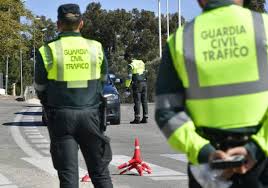 All drivers fear receiving a traffic fine, whether for speeding, not stopping at a red traffic light, or driving under the influence of alcohol. In short, any violation listed in the Reglamento General de Trafico (General Traffic Regulations) can result in a penalty.
All drivers fear receiving a traffic fine, whether for speeding, not stopping at a red traffic light, or driving under the influence of alcohol. In short, any violation listed in the Reglamento General de Trafico (General Traffic Regulations) can result in a penalty.
Guardia Civil at a roadblock [Photo: La Verdad]
Yet, it is often thought that these penalties only apply to the driver. WRONG! The truth is that passengers can also be fined for certain things.
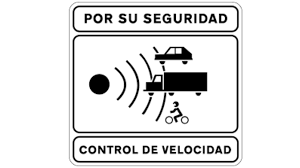 In fact, there are fines that are aimed specifically at the occupants of the vehicle, even if they are not driving. In other words, the rules must be followed by both the driver and the passengers, since the aim is to guarantee road safety.
In fact, there are fines that are aimed specifically at the occupants of the vehicle, even if they are not driving. In other words, the rules must be followed by both the driver and the passengers, since the aim is to guarantee road safety.
[Drivalia]
Not wearing a seat belt:
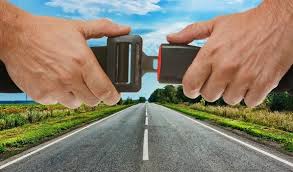 All vehicle occupants are required to wear their seat belt properly fastened. The fine for not wearing it is 200 euros, without this resulting in a loss of points on the driving licence, as stated in Article 117 of the RGC. This measure aims to reduce the risk of serious injuries in the event of a collision, regardless of the passenger's position in the vehicle.
All vehicle occupants are required to wear their seat belt properly fastened. The fine for not wearing it is 200 euros, without this resulting in a loss of points on the driving licence, as stated in Article 117 of the RGC. This measure aims to reduce the risk of serious injuries in the event of a collision, regardless of the passenger's position in the vehicle.
[Academia del Transportista]
Throwing objects out of the window:
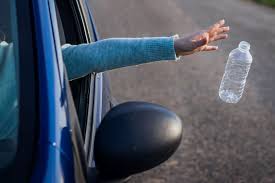 Throwing cigarette ends, containers, or any other object out of the window is strictly prohibited. This action not only constitutes a lack of civility but can also cause accidents or fires, especially in forested areas. The penalty for a passenger who commits this offense is 500 euros. If the driver does it, in addition to the fine, 6 points will be deducted from their license, as stated in Article 6 of the RGC.
Throwing cigarette ends, containers, or any other object out of the window is strictly prohibited. This action not only constitutes a lack of civility but can also cause accidents or fires, especially in forested areas. The penalty for a passenger who commits this offense is 500 euros. If the driver does it, in addition to the fine, 6 points will be deducted from their license, as stated in Article 6 of the RGC.
[Expansion Politica]
Maintaining an incorrect sitting position in the vehicle:
 Adopting dangerous positions, such as resting your feet on the dashboard or sticking part of your body out of the window, is considered an offence. Even if the behaviour is committed by a passenger, the fine falls on the driver, who is responsible for ensuring that all occupants travel seated correctly. Penalties range from 80 to 100 euros, depending on the severity of the case, according to Article 18 of the RGC.
Adopting dangerous positions, such as resting your feet on the dashboard or sticking part of your body out of the window, is considered an offence. Even if the behaviour is committed by a passenger, the fine falls on the driver, who is responsible for ensuring that all occupants travel seated correctly. Penalties range from 80 to 100 euros, depending on the severity of the case, according to Article 18 of the RGC.
[SlashGear]
Dangerous use of electronic devices:
 Reckless use of mobile phones or electronic devices by passengers can create dangerous distractions for the driver.
Reckless use of mobile phones or electronic devices by passengers can create dangerous distractions for the driver.
Although the law does not specify a penalty for this behaviour, if it is shown that their actions affected the driver’s attention, the driver could be penalised for negligent driving or lack of attention.
[Freepik]
Showing disrespect towards law enforcement officers:
 Any disrespectful behaviour or defiant attitude towards law enforcement officers can result in a direct penalty for the passenger.
Any disrespectful behaviour or defiant attitude towards law enforcement officers can result in a direct penalty for the passenger.
Disrespect, disobedience, or refusal to cooperate with traffic controls are considered offences and can lead to fines depending on the severity of the case, even if the offender is not the one driving.
[Police 1]
Last Word:
These are the most common delictos, but they are not the only ones. If we look at the Código General de Circulación (General Traffic Code), we see that there are also cases where the responsibility does not fall directly on the passenger.
For example, if the offender is a minor, their parents or guardians will be the ones to get the fine, especially if the child is not wearing a seatbelt or using a child restraint system.
Additionally, when more people are travelling than allowed by the vehicle, the fine, which can range from 80 to 500 euros, is directed solely at the driver, as it is s/he who is responsible for the excess number of occupants.
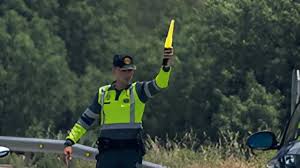
An agent of Guardia Civil Tráfico [20Minutos]
© Paul Whitelock
Pictures:
20Minutos, Academia de Transportista, Drivalia, Expansion Politica, Freepik, La Verdad, Police 1, SlashGear,
With thanks to:
Paul Whitelock (Translations)
CGT, DGT, Francisco Miralles, NoticiasTrabajo, Reglamento General de Trafico, Wikipedia (Sources)
Tags:
20Minutos, Academia del Transportista, CGT, delicto, DGT, Drivalia, Expansion Politica, fine, Francisco Miralles, Freepik, guardia civil, La Verdad, NoticiasTrabajo, Paul Whitelock, penalty, police, Police 1, Reglamento General de Trafico, SlashGear, Trafico, Wikipedia